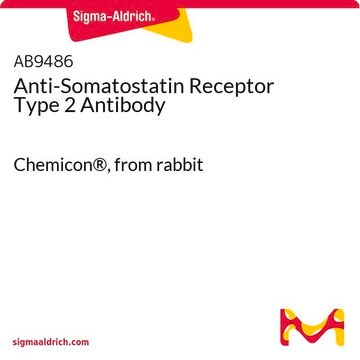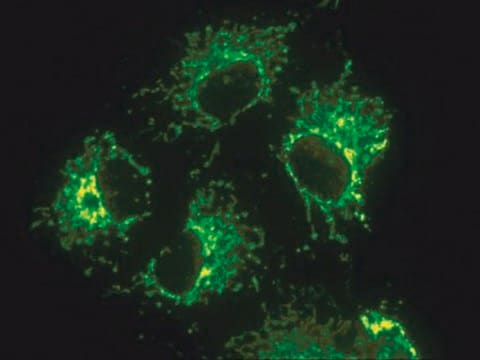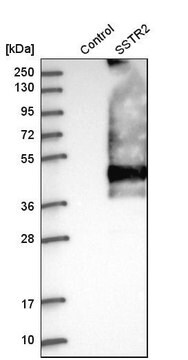Recommended Products
General description
FUNCTION: SwissProt: Q92796 # Required for learning most likely through its role in synaptic plasticity following NMDA receptor signaling.
SIZE: 817 amino acids; 90344 Da
SUBUNIT: Interacts through its PDZ domains with GRIN2B and SYNGAP1. Interacts through its guanylate kinase-like domain with DLGAP1, DLGAP2, DLGAP3 and DLGAP4 (By similarity). Interacts through its PDZ domains with APC. Interacts through its first two PDZ domains with ERBB4. Interacts through its third PDZ domain with NLGN1, and probably with NLGN2 and NLGN3.
DISEASE: SwissProt: Q92796 # Defects in DLG3 are the cause of non-syndromic mental retardation X-linked type 90 (MRX90) [MIM:300189]. Mental retardation is characterized by significantly sub-average general intellectual functioning associated with impairments in adaptative behavior and manifested during the developmental period. Non- syndromic mental retardation patients do not manifest other clinical signs.
SIMILARITY: SwissProt: Q92796 ## Belongs to the MAGUK family. & Contains 1 guanylate kinase-like domain. & Contains 3 PDZ (DHR) domains. & Contains 1 SH3 domain.
SIZE: 817 amino acids; 90344 Da
SUBUNIT: Interacts through its PDZ domains with GRIN2B and SYNGAP1. Interacts through its guanylate kinase-like domain with DLGAP1, DLGAP2, DLGAP3 and DLGAP4 (By similarity). Interacts through its PDZ domains with APC. Interacts through its first two PDZ domains with ERBB4. Interacts through its third PDZ domain with NLGN1, and probably with NLGN2 and NLGN3.
DISEASE: SwissProt: Q92796 # Defects in DLG3 are the cause of non-syndromic mental retardation X-linked type 90 (MRX90) [MIM:300189]. Mental retardation is characterized by significantly sub-average general intellectual functioning associated with impairments in adaptative behavior and manifested during the developmental period. Non- syndromic mental retardation patients do not manifest other clinical signs.
SIMILARITY: SwissProt: Q92796 ## Belongs to the MAGUK family. & Contains 1 guanylate kinase-like domain. & Contains 3 PDZ (DHR) domains. & Contains 1 SH3 domain.
Purified peptide from the N-terminus of rat Somatostatin Receptor Type 2 (Accession number P30680).
Specificity
Recognizes Somatostatin Receptor Type 2 (SSTR2).
Application
Western blot: 1:200-1:500 using ECL on rat brain and pancreas lysate.
Dilutions should be made using a carrier protein such as BSA (1-3%).
Optimal working dilutions must be determined by the end user.
Dilutions should be made using a carrier protein such as BSA (1-3%).
Optimal working dilutions must be determined by the end user.
Physical form
Lyophilized from phosphate buffered saline, pH 7.4, containing 1% BSA, and 0.05% sodium azide as a preservative. Reconstitute with 200 μL of sterile deionized water. Centrifuge antibody preparation before use (10,000 xg for 5 min).
Lyophilized from phosphate buffered saline, pH 7.4, containing 1% BSA, and 0.05% sodium azide as a preservative. Reconstitute with 50 μL of sterile deionized water. Centrifuge antibody preparation before use (10,000 xg for 5 min).
Storage and Stability
Maintain lyophilized material at -20°C for up to 12 months after date of receipt. After reconstitution maintain at -20°C in undiluted aliquots for up to 6 months. Avoid repeated freeze/thaw cycles.
Other Notes
Included free of charge with the antibody is 40 µg of control antigen (lyophilized powder). The stock solution of the antigen can be made up using 100 µL of sterile deionized water. For negative control, preincubate 1 µg of peptide with 1 µg of antibody for one hour at room temperature. Optimal concentrations must be determined by the end user.
The immunogen sequence is 12 of 15 amino acids identical in human and porcine.
Disclaimer
Unless otherwise stated in our catalog or other company documentation accompanying the product(s), our products are intended for research use only and are not to be used for any other purpose, which includes but is not limited to, unauthorized commercial uses, in vitro diagnostic uses, ex vivo or in vivo therapeutic uses or any type of consumption or application to humans or animals.
Storage Class Code
10 - Combustible liquids
Certificates of Analysis (COA)
Search for Certificates of Analysis (COA) by entering the products Lot/Batch Number. Lot and Batch Numbers can be found on a product’s label following the words ‘Lot’ or ‘Batch’.
Already Own This Product?
Find documentation for the products that you have recently purchased in the Document Library.
Our team of scientists has experience in all areas of research including Life Science, Material Science, Chemical Synthesis, Chromatography, Analytical and many others.
Contact Technical Service







